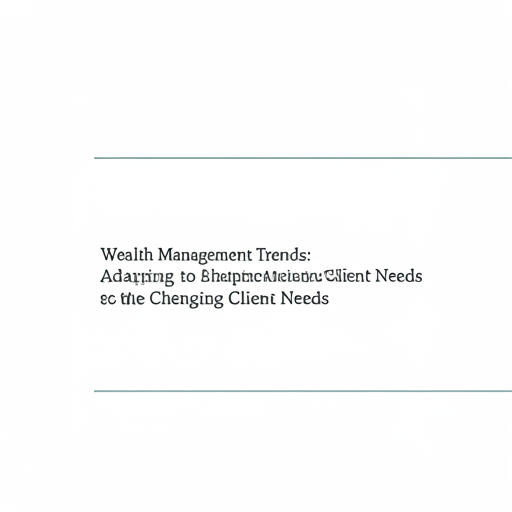Introduction to Wealth Management in the Cryptocurrency Era
The Evolution of Wealth Management
Wealth management has undergone significant transformation in recent years, particularly with the rise of cryptocurrency. This evolution reflects changing client expectations and the need for financial advisors to adapt. As investors increasingly seek exposure to digital assets, wealth managers must integrate these options into their strategies. The landscape is shifting rapidly. Many clients now view cryptocurrencies as viable investment vehicles. This shift presents both opportunities and challenges for professionals in the field. It is essential for advisors to stay informed about market trends. Knowledge is power in this dynamic environment. Understanding the implications of blockchain technology is crucial. It can enhance transparency and security in transactions.
Impact of Cryptocurrency on Traditional Wealth Management
The emergence of cryptocurrency has fundamentally altered traditional wealth management practices. Financial advisors now face the challenge of incorporating dogital assets into diversified portfolios. This integration requires a nuanced understanding of asset volatility and regulatory frameworks. Many clients are increasingly demanding exposure to cryptocurrencies. This demand can complicate risk assessment and asset allocation strategies. Advisors must adapt their methodologies accordingly. It is crucial to evaluate the long-term viability of these assets. Knowledge of blockchain technology is essential. It enhances dealing efficiency and security.
Understanding Client Needs in a Digital Age
Shifts in Client Demographics
Client demographics are shifting significantly in today’s d gital landscape. Younger investors are increasingly entering the market. They often prioritize technology-driven solutions and transparency. This trend necessitates a reevaluation of traditional wealth management approaches. Advisors must understand the unique preferences of this demographic. Engaging with clients through digital platforms is essential. Many clients expect real-time access to their portfolios. This demand can enhance client satisfaction and loyalty. Understanding these shifts is crucial for success.
Changing Attitudes Towards Risk and Investment
Investors are increasingly adopting a more dynahic approach to risk and investment. This shift is influenced by several factors, including market volatility and technological advancements. Many clients now exhibit a greater willingness to explore alternative assets. Key changes in attitudes include:
These trends indicate a departure from traditional risk aversion. Advisors must adapt their strategies accordingly. Understanding client psychology is essential. Many clients seek personalized investment experiences. This demand can drive innovation in wealth management.
Integration of Cryptocurrency into Wealth Management Strategies
Asset Allocation and Diversification
Integrating cryptocurrency into asset allocation strategies requires careful consideration of risk and return profiles. Advisors must evaluate the correlation between digital assets and traditional investments. This analysis can enhance portfolio diversification. Many investors are now allocating a portion of their portfolios to cryptocurrencies. This trend reflects a growing acceptance of alternative assets. It is essential to balance exposure to mitigate volatility. Understanding market dynamics is crucial. Clients often seek guidance on optimal allocation percentages. This knowledge can lead to informed decision-making.
Tax Implications and Regulatory Considerations
The integration of cryptocurrency into wealth management strategies necessitates a thorough understanding of tax implications. Tax treatment varies significantly across jurisdictions. Advisors must ensure compliance with reporting requirements. This compliance can prevent costly penalties. Additionally, capital gains taxes may apply upon asset liquidation. Clients should be informed about potential tax liabilities. Awareness of these factors is essential for effective planning. Many investors overlook these critical considerations. Proper guidance can optimize tax efficiency.
Technological Innovations Shaping Wealth Management
Blockchain Technology and Its Applications
Blockchain technology offers transformative applications in wealth management. Its decentralized nature enhances security and transparency in transactions. Key applications include:
These innovations streamline processes and reduce costs. Advisors can leverage blockchain for improved client trust. Many clients appreciate enhanced data integrity. Understanding these technologies is vital for competitive advantage.
Robo-Advisors and AI in Cryptocurrency Investment
Robo-advisors and artificial intelligence are revolutionizing cryptocurrency investment strategies. These technologies analyze vast amounts of data to identify trends and optimize portfolios. By utilizing algorithms, they can provide personalized investment recommendations. This approach enhances efficiency and reduces human error. Many investors appreciate the accessibility of robo-advisors. They often offer lower fees compared to traditional advisors. Understanding these tools is essential for informed decision-making. Clients can benefit from real-time insights and automated rebalancing. This innovation is reshaping the investment landscape.
Building Trust and Transparency with Clients
Educating Clients on Cryptocurrency Risks and Rewards
Educating clients about cryptocurrency involves discussing both risks and rewards. Understanding market volatility is crucial for informed decision-making. Key points to cover include:
Clients must grasp these dynamics to build trust. Transparency in communication fosters stronger relationships. Many clients appreciate clear explanations of complex concepts. This knowledge empowers them to make better choices. Providing ongoing education is essential for long-term engagement.
Establishing Credibility in a Volatile Market
Establishing credibility in a volatile market requires consistent communication and expertise. Advisors must demonstrate a deep understanding of market dynamics. This knowledge reassures clients during uncertain times. Key strategies include:
Clients value transparency in all interactions. Clear explanations of investment decisions build trust. Many clients feel more secure with informed guidance. This approach fosters long-term relationships. Continuous education is vital for maintaining credibility.
The Future of Wealth Management in a Cryptocurrency World
Emerging Trends and Predictions
Emerging trends in wealth management indicate a significant shift towards cryptocurrency integration. Advisors are increasingly adopting digital assets in client portfolios. This trend reflects growing client demand for diversification. Key predictions include:
These developments will reshape traditional wealth management practices. Clients will expect more personalized services. Understanding these trends is essential for future success. Many investors are eager to explore new opportunities.
Preparing for the Next Wave of Financial Innovation
Preparing for the next wave of financial innovation requires a proactive approach. Wealth managers must stay informed about emerging technologies. This includes understanding the implications of decentralized finance (DeFi) and digital currencies. Key areas to focus on include:
These strategies can enhance service offerings. Many clients seek innovative solutions for their investments. Embracing change is essential for long-term success. Continuous learning will be vital in this evolving landscape.
